Media Statement by MP for Bangi and DAP Assistant Political Education Director, Dr. Ong Kian Ming on 19 October 2021:
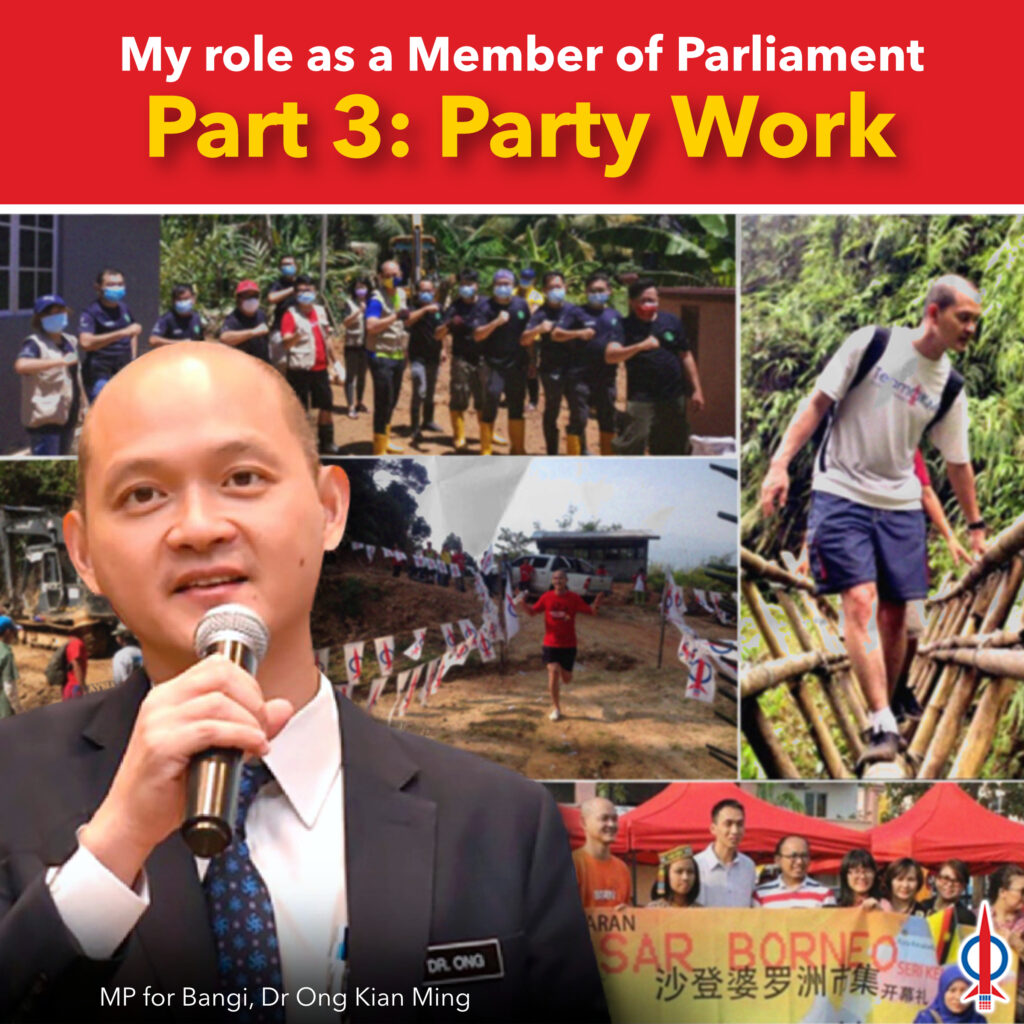
- Part 1 – Advocating for Parliamentary reforms and explaining the importance and relevance of Parliament
- Part 2 – Constituency Serving
One of the most memorable things which Lim Guan Eng said to me during our first conversation back in October 2001 was that if he were to contest in the Kota Melaka parliamentary seat as an independent candidate (he was their three term MP from 1986 to 1998), he would definitely lose the contest despite his own personal popularity in the constituency. He made this point to emphasise the importance of the DAP to his political career and that apart from the party, he (and others) would not have a leg to stand on, politically.
Most voters do not understand nor see the value of the party work which an elected representative must do on a regular basis. This is not surprising since most politicians have not really bothered to explain the importance of their political work to their voters. From personal experience, I have seen how party work, if done right, can strengthen an MP’s effectiveness in carrying out his or her duties at the local, state, and national levels. However, I can also see how party work, if not properly structured and incentivised, can easily lead outcomes that may benefit the MP and his party members but leave the voters to either no better or sometimes, even worse off.
At the very basic level, my party work starts with making sure that I have a good working relationship with my grassroot members in my parliamentary constituency. With a strong and dedicated grassroot team, I can carry out far more programmes such as mobile vaccination in low-cost apartment areas and conduct more effective constituency outreach such as doing emergency gotong-royongs after serious incidents of flooding.
I have a group of about forty volunteers under my ‘Unit Tindak Bangi’ team, most of which are party members, which I can call on regularly to do various programs in my constituency. They have been especially important during the pandemic because of the higher frequency of activities which need to be carried out such as food basket distribution, sanitization, and Covid-19 vaccination related programmes.
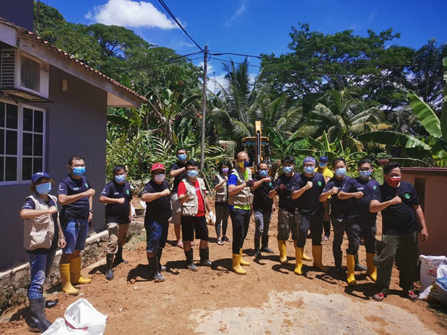
Thankfully, the culture within the DAP is such that the most effective way to “win over” your grassroot is to work hard together with them for constituency work and to spend leisure time with them after the hard work is done. There is no need for political patronage here unless you count the occasional dinner and drinks after a hard day’s work in the constituency.
Since I am part of the DAP Selangor State Committee, I often visit branches throughout the state on a yearly basis to attend their Annual General Meetings (AGMs). I have often found these meetings helpful since members would usually take this time to update me and other DAP State Committee members of the latest issues which they are facing at the local, state, and national levels. The state leaders would then try to divide the issues up and address them at the appropriate levels to the appropriate people and channels.
At the national level, as Assistant National Political Education Director, I’ve worked well with Liew Chin Tong, the National Political Education Director, to increase the level of policy discussion within the party at various levels on several topics from waste management to understanding the federal budget to renewable energy, just to name a few. Before GE2018, I was also working to build up the internal research capacity of the DAP to tackle policy research and analysis on an ongoing basis.
Many of the DAP HQ personnel were ‘hollowed out’, and rightly so, as many sought opportunities to work with Ministers and Deputy Ministers when Pakatan Harapan (PH) was in power after GE14. We have begun the slow process of rebuilding our internal capacities after the Sheraton move. The Melaka Snap State Elections may be the first test of our internal capabilities (publicity, campaigning, social media outreach, walkabouts) if an emergency is not declared.
In the meantime, the detailed analysis of past election results, changes in the electoral roll and projection of possible results are still my responsibility (given my background as a political scientist and management consultant), although I eagerly wait for someone else to take over this role!
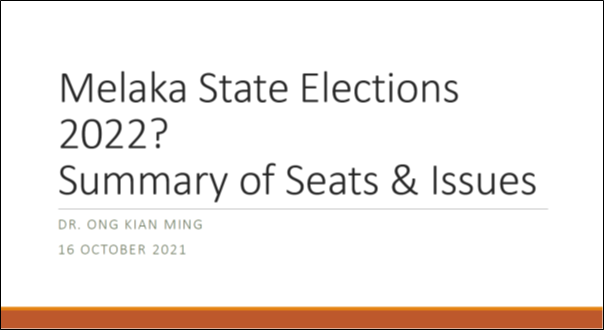
I am thankful that my time in DAP has given me a reason to travel to different parts of the country to meet with my colleagues for varying reasons. And in doing so, I’ve learned an immeasurable amount about the challenges Malaysians face in different parts of the country and the ways in which my colleagues try to assist their fellow countrymen.
Travelling around the country for political work obviously involves political campaigning. I don’t think we need to pretend otherwise. If we as politicians think that we can better serve the people and our country as elected representatives, it would be irresponsible for us not to campaign hard to win more seats and with this, greater political and policy influence. The most important caveat I would put here is that we know we have crossed the line when we seek power for the sake of power itself and forget that the power which we wield as policy makers and politicians should be used to improve the livelihoods of the people, not to enrich ourselves and members of our own party.
My first exposure to party work was in preparation of the 2011 Sarawak State Elections. I was given the responsibility of providing election analysis at the polling stream (saluran) and polling district (daerah mengundi) levels for my colleagues in the Kuching, Sibu, Bintulu and Miri areas (I recall the current state assembly representative or ADUN of Subang Jaya, Michelle Ng, following myself and Tony Pua to Sarawak as an intern for some of these briefing sessions).
During the state elections, I was given the task of setting up a call centre in Sibu where we would call and text voters across the state, especially in the marginal seats. It was a good learning experience for me. Not surprisingly, there were many people who asked us where we obtained their phone numbers from when we called them. Many refused to indicate which party they would be supporting for the state elections. Most of the people we hired to man the call centres were young students and it was here that I found out that most young Sarawakians would learn how to ride a motorcycle before even getting a license!
After the 2011 Sarawak State Elections, I had the opportunity to travel to other parts of Sarawak as part of the Impian Sarawak program, spearheaded by Tony Pua. The plan was to do small development projects in the rural areas of Sarawak to show that even though we were the opposition party, we would still bring development projects to the rural constituencies. Through Impian Sarawak, I was part of a team that worked for about a month to build a 3km gravel road up to Kampung Kiding in the Borneo Highlands. What was once an hour’s uphill hike became a 5 minute journey on a 4WD. We even organized a Kampung Kiding run to commemorate the completion of the gravel road!
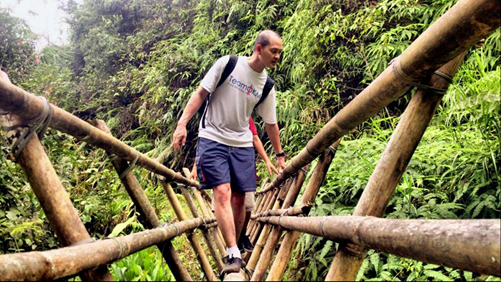
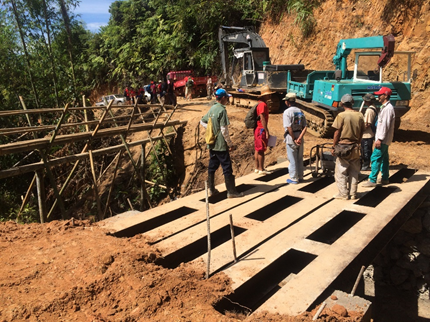
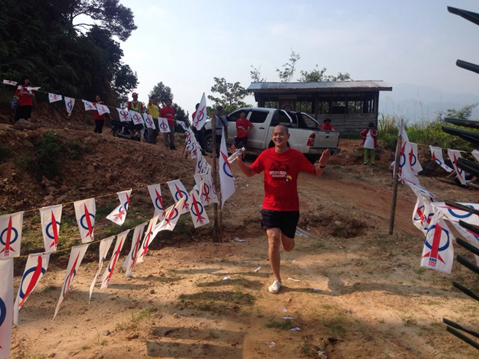
There were other community housing repair and upgrading projects (in Mas Gading), numerous water gravity projects (in Pakan, a rural area one and a half hours from Sibu) as well as medical and education camps. While these projects may not have resulted in immediate electoral gains, especially for the 2016 Sarawak State Elections, the exposure which our members, especially those from Peninsular Malaysia to the development conditions in the rural areas in Sarawak and Sabah, was definitely an eye-opener!
My exposure to the issues faced by Sarawakians and Sabahans also motivated me to look out for the presence of East Malaysians in the Klang Valley which then led me to push for an East Malaysian-themed morning market in Seri Kembangan (which was in my then parliamentary constituency of Serdang). Pasar Borneo Seri Kembangan was launched in April 2016 and I am glad to say, has grown to twice the size since then (before Covid-19) and is quite well known among East Malaysians who live in the Klang Valley. There are plans to open another Pasar Borneo in Bangi in the very near future.
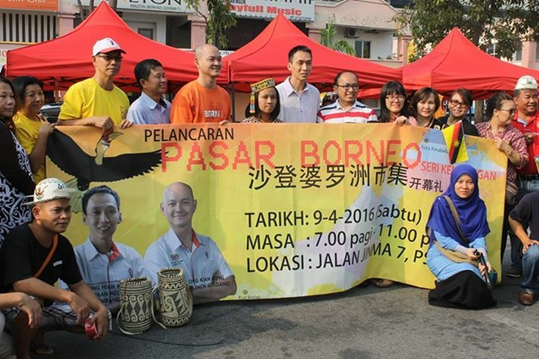
In addition to providing election analysis for the Sarawak State Elections, I would also prepare election analysis materials for by-elections at the state and parliamentary levels. Of course, the level of analysis and involvement in each campaign differed according to the constituency and the parties contesting. I was more involved in the Teluk Intan parliamentary by-elections which took place in 2014 where DAP fielded Dyana Sofya in a spirited campaigned that fell short by a few hundred votes. I was also more involved in the Sungai Besar parliamentary elections in 2016 because Sekinchan, a DAP stronghold, was part of this parliamentary constituency and this was the first time that AMANAH was contesting in a by-election.
One of the more memorable programmes that I was involved in was the flood relief efforts in Kelantan at the end of 2014. The late Eddie Ng, former ADUN for Balakong, organised a convoy of trucks and lorries to bring supplies to Gua Musang and Kuala Krai and volunteers to help in cleaning efforts. We ended up spending New Year’s Eve at the R&R in Genting Sempah eating McDonalds on the way back to KL!
My other colleagues who are very popular as speakers at ceramahs or dinners organized by various DAP branches such as Nga Kor Ming, Teo Nie Ching, Anthony Loke, Gobind Singh, Tony Pua, Lim Guan Eng, just to name a few, would regularly travel around the country to help our comrades in their fund-raising efforts.
All this party work may seem like a waste of time to many of the voters of an elected representative. But if carried out well, such party work may not only further the career on an elected representative but have positive spillover effects for the party of the representative, the constituency and state he or she represents and even the entire nation.
A politician who has regular engagement with members in different part of the state would have a more holistic view on the development needs beyond just his or her constituency.
For example, land titles and temporary occupation licenses (TOLs) are a regular problem faced by farmers and fishermen in the new villages on the coast of Selangor but less so in a developed area like Petaling Jaya. Road access is more of a serious issue in Hulu Selangor and less so in Kajang or Bangi. Pollution from factories is more likely to be found in Klang or Balakong than in Subang Jaya. Being familiar with different issues affecting different areas in Selangor would prepare an elected rep for a state-wide office, as an EXCO for example, in state politics. Similarly, exposure to different national issues from traveling and speaking to members in different parts of different states would prepare a leader for future office as a Deputy Minister or Minister at the Federal level.
Politicians with a wider degree of exposure would also be better placed to come up with the right policies at the local, state, or national levels to address these challenges. Sharing of different ideas and solutions would also increase the capacity and ability of various leaders within a political party to solve the rakyat’s problems. A party’s whose leadership is incentivized to reach out to members and communities all over the country would also find itself strengthened over time in terms of outreach and influence, especially if the activities of the party is outward looking and inclusive and not just focused on one or two communities.
Of course, what I am describing is what would happen under ideal circumstances. Party work could easily transform into party patronage. Party leaders, rather than trying to win the support of members through hard work and building up the party in the larger community, may seek to provide political patronage to a small group of members to ensure that they maintain their party positions at the local, state, and national levels. We have already seen this happen in other political parties in the country. Perhaps DAP was in power at the federal level for far too short of a time (only 22 months) for the politics of patronage to creep in (How to minimize the risk of this happening if we come back into power again would require another article or two).
At the end of this piece, I hope that the reader is more enlightened with regards to what party work entails. I have left out many important parts such as the need for structures to bring more youth and their ideas and energy into the party and into the political process. I hope that at the very least, I have managed to convince the reader that party work is not a waste of time and can be a good thing for the people and the country if correctly structured and incentivised.



